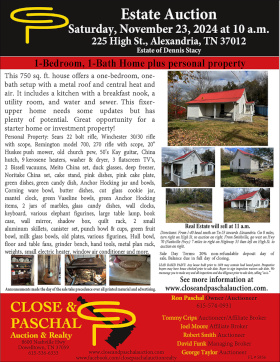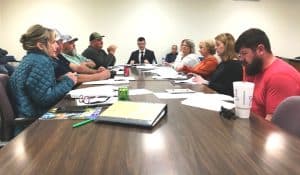News
May 16, 2024
By: Dwayne Page
Denied again!
For the second week in a row, the budget committee has denied a proposal recommending to the full county commission that an initial and detailed bond resolution be adopted authorizing funding not to exceed $65 million for a judicial center once a new tax levy is established.
During Tuesday night’s meeting, the budget committee voted 4 to 2 against forwarding such a recommendation at this time. Only members Glynn Merriman and Chairman Jeff Barnes voted in favor. The other four members present, Tom Chandler, Sabrina Farler, Tony (Cully) Culwell, and Mathias Anderson voted against it. Member Susannah Cripps was absent. This vote did not include any recommendation on a funding source for the project even though that will have to be considered prior to adoption of the budget for 2024-25.
At the previous budget committee meeting on Thursday, May 9, the vote was 3 to 2 in favor, but it failed because a majority or four votes of the seven-member committee were needed in the affirmative to forward the recommendation.
In November, the jail committee, which is made up of the entire county commission, voted to recommend to the full commission that a judicial center be built rather than a new jail to meet needs and requirements for continued state certification. Last month the jail committee selected a construction option for a judicial center to be considered by the full county commission. The estimated cost is $63,817,500 (not counting purchase price for property and the expense of staffing). At that time, county officials said the project could require as much as a 65-cent property tax increase or a combination 47 cent property tax hike coupled with a $50 wheel tax. But during Tuesday night’s meeting, the county’s fiscal agent and financial advisor Steve Bates suggested that the property tax hike needed could be less, at up to 55 cents, which if approved would put the overall tax rate at $2.55 per $100 of assessed value. The tax rate is currently $2.00. A year ago, the county property tax rate was just over $1.73 until the county commission increased it by 27 cents with passage of the 2023-24 budget last June.
Without eventual passage of a bond resolution, recommended by the budget committee, County Mayor Matt Adcock said the judicial center project cannot move forward. Still, budget committee members seem to be struggling with how to handle this issue.
“I think everyone’s concern really is the funding aspect of it,” said budget committee member Mathias Anderson. “I am curious about all our options because right now its either a wheel tax, a property tax increase through either a percentage increase or would we have an increase without changing anything if there is a (property) reassessment? I mean are those the only three options as far as revenue goes?” I don’t have a clue how the property assessor is set up and what his numbers look like but would it be uncommon to do a (property) reassessment at this point,” asked Anderson.
“The only revenue source you have right now is the property tax,” explained Bates. “Anything else you want to implement later to offset that would have to be taken up for fiscal year 2025-26 if you have something (funding source) in place prior to that,” he said.
Budget committee members Sabrina Farler and Tony (Cully) Culwell seem to have reservations now about building a judicial center rather than a jail apparently based on public response.
“We have to build a jail. Not sure about a judicial center at this point. That’s where I am at,” said Farler.
“Me too” said Culwell.
“I know that scares us and it scares me because I want to move our county forward but I am just scared from what my constituents are saying. They are not calling and telling me to please vote for a judicial center,” Farler explained.
“Everybody knows we need a jail, but the justice center they (public) don’t see,” added Culwell.
Unless a new jail is built in close proximity to the courthouse, County Mayor Adcock said the sheriff’s department would have to transport prisoners back and forth from the jail to the courthouse every time court is in session and that could have an impact over time on the county budget in terms of fuel, personnel, vehicles, and other costs which would be recurring. That would not necessarily be the case if a judicial center is built, according to Adcock because the entire operation of the sheriff’s department, jail, and judicial system (courtrooms and clerks offices) would be in the same complex. And while a jail can be built outside the city, a judicial center, by law, must be inside the city limits of Smithville.
Although the jail committee has discussed and considered several possible sites both inside and outside the city for a judicial center, none have been selected for purchase. And annexation may no longer be an option. According to County Mayor Adcock, City of Smithville officials have signaled an unwillingness to annex any property selected by the county outside the city for a judicial center or jail.
County Mayor Adcock admonished the committee to not let public opposition sway their decision on this project.
“When people come and ask you about this have you (budget committee) explained to them why we picked a judicial center over a jail such as the increased costs in staffing, higher fuel and vehicle maintenance costs, buying buses to transport prisoners back and forth from the jail to the courthouse,” asked County Mayor Adcock
“The people that are making these statements (in opposition), they are not the ones in your seats that are responsible for making an educated decision on this. You can’t let the people out here who don’t have any idea what this situation is about to make the decision for you because you are the ones here with this information and you are the ones who have the responsibility to make a decision that is in the best interest of DeKalb County. The whole public doesn’t see the big picture,” said County Mayor Adcock.
“We are faced with the classic dilemma that also faces particularly members of our House of Representatives and Senate and that is do I do what my gut tells me is the right thing to do or do I do what my constituents are telling me do,” said budget committee member Tom Chandler.
“You have to do the right thing. It may be very uncomfortable but we all truly know what the right answer is,” replied County Mayor Adcock.
Budget committee member Glynn Merriman said he plans to stick with the plan that the jail committee/county commission decided to pursue.
“Here is the way I feel. We all voted to build a judicial center. We did. And I have the brass to stand up and state that I am going to stick with it,” said Merriman.
“I do have concerns about the weight of this (decision) falling on the budget committee,” said Chandler. “It shouldn’t be that way. It should fall on the full commission as a whole,” he said.
“The budget committee’s job is to compile a consolidated budget document and to recommend a tax levy to fund that budget,” Bates explained.
Chandler asked if the budget committee could simply present the full commission with the numbers as to the costs and tax levy needed to fund the project without making a recommendation.
“What happens if this committee does not vote to go forward to give a recommendation to the full county commission to do this? It seems to me it wouldn’t stop the full commission from voting and deciding whether or not to issue bonds for this,” said Chandler. “Is it possible for us (budget committee) to go to the commission and say here is the situation we are faced with. Here are the numbers that have been presented to us. We have considered the fact that you have said you wanted to build a judicial center. We have this budget and we have this outstanding desire on the part of the committee, we think, to build a judicial center. And then we say if you want to do that, this is what the tax levy has to be. It doesn’t say we (budget committee) are recommending that tax levy. It is simply saying this is what you must have if you want to do that (move forward). Its up to you now to collectively decide if you are going to do it,” said Chandler.
Bates said the budget committee could send over a proposal or budget without a recommendation, but it must establish a tax levy for the county commission to consider. If the commission should reject it, the budget committee would have to revisit it.
“You could present it to the board of county commissioners without a recommendation from the budget committee, but again the budget committee’s job is to set the tax levy to fund it,” explained Bates. Once you do that it goes to the board of county commissioners, but they will not be able to amend the tax levy resolution from the floor for debt service. That is the only fund (debt service) that you cannot amend from the floor. You (budget committee) have to set the tax levy in the consolidated budget for the board of county commissioners to consider. Once it goes to the floor and they consolidate the budget, they can amend the budget in any fund except debt service. If they don’t want to pass it, then you will either have to recess that meeting and reject the budget and the bond resolution, bring it back, cut the tax levy out of debt service, and then send it back to the board of county commissioners to pass it as is,” said Bates.
Whether the county commission moves forward with plans for a judicial center or changes it to a jail, Bates said it could still adopt the $65 million bond resolution and re-define the terms of the project.
“If you should decide to do only a jail, you can still do the bond resolution not to exceed $65 million, set the tax levy, and amend it to say the project is for a jail instead of a judicial center and be done with it,” said Bates
According to Bates, a property tax increase will be needed in the 2024-25 fiscal year as an initial funding source for debt service for a jail or judicial center even if a wheel tax is later adopted by the county commission or through a public referendum. If a wheel tax is eventually approved for the project, Bates said the property tax increase could be reduced to help offset it.
“Right now, its not going to be a wheel tax. Its going to be a property tax (to fund it) but even if you implement a property tax increase now that revenue won’t come in probably until February or March. If you want a wheel tax then you must adopt it at two consecutive county commission meetings by a two thirds majority and then if people protest it by petition, then it has to go to a public referendum, or you can vote to put it on the ballot in November. But regardless, you are going to have to increase the property tax now in this budget. Then if the wheel tax passes, you can cut the property tax back in the 2025-26 fiscal year. That way people have a choice of either funding this through a property tax, wheel tax, or a mix of both,” said Bates.
‘If you adopt an initial bond resolution and a detailed bond resolution authorizing the issuance of not to exceed $65 million in bonds, we (county) would sit on it (for now) because if you are going to issue bonds you must have a funding mechanism in place to pay that. You cannot go to a rating agency without a funding mechanism in place or you’ll get crushed. If you set the tax levy the revenue will be in place. That way, with the bond resolution in place, when you are ready to issue bonds which could be six or eight months later you already have the revenue coming into the debt service fund to pay the debt as it becomes due and payable. You cannot issue debt thinking that the money is going to come in. You must know it’s coming in,” explained Bates.
Again, the county commission has the option of voting in a wheel tax by a two thirds majority on two separate readings of a resolution, but the public could force a referendum by petition.
According to the election commission, the law states that “The petition must be filed by a number of registered voters amounting to at least ten percent (10%) of the votes cast in the county in the last gubernatorial election (locally 523 signatures); and the petition must be filed with the county election commission within thirty (30) days of final approval of such resolution by the county legislative body.
The next county budget committee meeting is set for Tuesday, May 28 at 6:00 p.m in the first floor meeting room of the courthouse.
Opportunity to Request a Referendum: Soybean Promotion, Research, and Information Program
May 15, 2024
By:
The Agricultural Marketing Service (AMS) announces that soybean producers may request a referendum to determine whether producers want the Secretary to conduct a referendum on the Soybean Promotion and Research Order (Order), as authorized under the Soybean Promotion, Research, and Consumer Information Act (Act). Participation in the request for referendum is voluntary. Producers should participate only if they wish to request a referendum on the program.
If at least 10 percent, not to exceed ⅕ of producers from any one State, of the 515,008 eligible producers determined by the U.S. Department of Agriculture (USDA) participate in the request for referendum, a referendum will be held within one year from that determination. If results of the request for referendum indicate that a referendum is not supported, a referendum will not be conducted. The results of the request for referendum will be published in a notice in the Federal Register.
Soybean producers may request a referendum during the 4-week period beginning May 6, 2024, and ending May 31, 2024.
To be eligible to participate in the request for referendum, producers must certify that they or the producer entity they are authorized to represent paid an assessment at any time between January 1, 2022, and December 31, 2023.
Form LS-51-1, Soybean Promotion and Research Order Request for Referendum, can be obtained from May 6, 2024, to May 31, 2024, by mail, FAX, or in person from Farm Service Agency (FSA) County Offices, or can be downloaded from https://www.ams.usda.gov/rules-regulations/researchpromotion/soybean . Completed forms and supporting documentation must be returned to the appropriate FSA County Office:
By FAX or in person no later than COB on May 31, 2024.
By mail postmarked by midnight on May 31, 2024, and must be received in the FSA County Office by COB on June 7, 2024.
Notice of the Request for Referendum was published in the February 2, 2024, Federal Register. For more information, contact Jeana Harbison, Research and Promotion Division; Livestock and Poultry Program, AMS, USDA; STOP 0249 – Room 2092-S; 1400 Independence Avenue, SW.; Washington, D.C. 20250-0249; tel. (202) 720-5705; or via the Internet at https://www.ams.usda.gov/rules-regulations/research-promotion/soybean .
God’s Food Pantry and Community Outreach Inc. Has Moved to Another Location
May 15, 2024
By:
God’s Food Pantry and Community Outreach Inc. which has been located for the past nine years at 430 E. Broad Street in Smithville has moved temporarily to Dogwood Plaza, Unit A, 1225 S. Congress Blvd., Smithville. This move was necessitated by the sale of the building and an increased rental fee of $2,500.00 monthly.
Given the space limitations at the Dogwood Plaza site, there will be a modification in one of the operations. “We will continue food deliveries on a twice a month basis to the 100 plus medically frail, elderly and/or disabled individuals. In addition, homeless and emergency requests and issues will be addressed on an as needed basis be it for food or other special assistance. However, the twice a month general pantry will be disrupted for a short term that is, until a larger space is located,” said spokesperson Pat Zornow.
If you are someone who attended the general pantries and there is need for food, please call the pantry and leave a message requesting assistance. The pantry phone number is (615)- 597-4540.
« First ‹ Previous 1 50 140 148 149 150151 152 160 250 2455 Next › Last »













